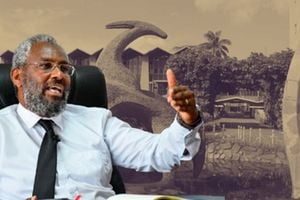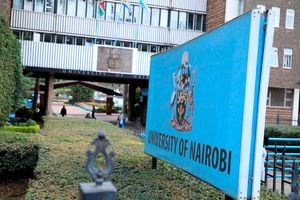
University of Nairobi (UoN) Ag Vice Chancellor Prof Margaret Jesang’ Hutchinson makes her presentation during a meeting on April 1, 2025 between Members of the National Assembly Departmental Committee on Education and University of Nairobi (UoN) senior management officials on matters concerning the affairs of the institution.
The University of Nairobi (UoN) management failed to provide evidence of the academic qualifications of its chief operating officer, Brian Ouma, when asked to do so by the National Assembly's education committee.
University officials struggled to clarify the circumstances surrounding Mr Ouma's recruitment and his academic qualifications. Lawmakers pressed for clarity on whether due process was followed in the hiring of Mr Ouma, whose position at the university has been controversial.
The UoN's legal officer, Fredrick Omondi, did not provide clear answers, instead citing an ongoing court case and injunctions that have stalled administrative action against the officer.
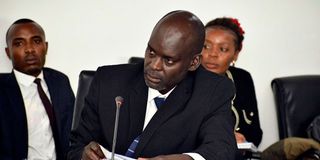
Mr Fredrick Collins Omondi, the University of Nairobi (UoN) Director, Legal and Corporate Board Services, speaks when he appeared before the National Assembly Departmental Committee on Education during a meeting with the University of Nairobi (UoN) senior management officials on April 1, 2025 at the UoN Towers.
During the proceedings at the university, it was revealed that Mr Ouma's application form stated that he had a degree in philosophy from the University of Albania (2000-2003).
According to the officials, Mr Ouma also holds a Master of Business Administration (MBA), but they did not specify from which university. He had also applied to the University of Nairobi for a Doctorate of Philosophy in Business Administration, specialising in strategic management.
However, there were discrepancies in his basic academic qualifications. His Kenya Certificate of Secondary Education (KCSE) results showed a C- (minus) and it was noted that he had undertaken a bridging programme, although specific details of the institution he attended and records of the bridging process were not documented.
The recruitment process for Mr Ouma's position was also questioned. Committee members sought clarification on whether due process had been followed and whether all the required qualifications had been met. Appointment documents indicated that one of the key requirements for the position was a Master's or Bachelor's degree with proven, demonstrable skills in fundraising for institutional development.
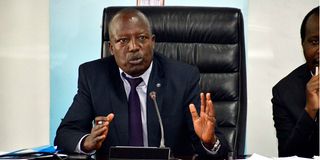
National Assembly Departmental Committee on Education Chairman Julius Melly during a meeting with University of Nairobi (UoN) senior management on April 1, 2025 at the UoN Towers.
“These are not my documents. I'm reading from Mr Brian Ouma’s Board of Director Postgraduate Studies application for admission. Brian Ouma states he earned a Bachelor's degree in Philosophy from the University of Albania (2003-2020) and an MBA, although he didn’t specify the university for his MBA,” said Mr Omondi.
“He also indicates that he’s applying for a Doctorate in Business Administration, specialising in Strategic Management at the University of Nairobi's Department of Business Administration, as a part-time student. This is what Mr Ouma submitted at the time of his employment and admission for postgraduate [studies].”
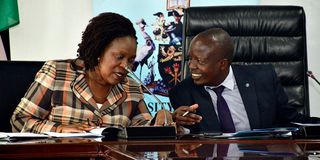
National Assembly Departmental Committee on Education Vice-Chairperson Obara Eve Akinyi with Chairperson Julius Melly during a meeting with the University of Nairobi (UoN) senior management officials on April 1, 2025 at the UoN Towers.
“I heard you say you recruited him in 2015. What did he provide and give us his basic education [qualifications],” said committee chair Julius Melly.
“Basic Education is not indicated in this form. But to the best of my knowledge, he has a KCSE certificate. He got a C- (minus)… From there, he undertook some bridging process,” answered Mr Mr Omondi.
“What was the process for the position and what was the position that he applied for and when was it advertised?” asked Mr Melly.
“The position was the deputy director, fundraising, relations and partnerships advancement. It was a new position in the university at the time. These are the minutes of appointment and they capture the efforts. They also outline the requirements for the post,” Mr Omondi replied.
Mr Melly said there were concerns about the university's failure to follow constitutional procedures.
"The university has consistently failed to seek proper management, and this is an ongoing issue. It is evident that there is a lack of accountability at all levels, and the council itself has taken a mandate that it does not have the competence to fulfil,” he said.
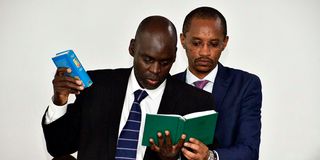
Mr Fredrick Collins Omondi, the University of Nairobi (UoN) Director, Legal and Corporate Board Services, takes his oath when he appeared before the National Assembly Departmental Committee on Education during a meeting with the University of Nairobi (UoN) senior management officials on April 1, 2025 at the UoN Towers.
He said that the council, which is supposed to uphold the mandate of running the university, had deviated from its responsibilities.
“You have flouted the rules for constitutional management, In fact, the council has been responsible for granting pay to individuals who were not even properly selected,” he said.
"This university department has no proper records to indicate who is performing well and who is not. We are paying salaries for individuals who have not been properly vetted or selected. It is a failure of management to encourage accountability, and ultimately, it is the taxpayers who are suffering.”
The committee, which has been investigating mismanagement at the UoN, expressed concern about the misuse of taxpayers' money, particularly in cases where individuals have not been held accountable for their roles.
"Individuals are drawing salaries without any oversight," Mr Melly stated. "This cannot continue. We need to ensure that public money is spent efficiently, and that everyone is held accountable for their actions."
The committee demanded that the university management provide all relevant documentation, including correspondence and minutes of meetings, to support their claims and facilitate a deeper investigation into the matter.
"We need these documents to assess whether the management is capable of running this university. Without transparency, we cannot make informed decisions,” he said.

